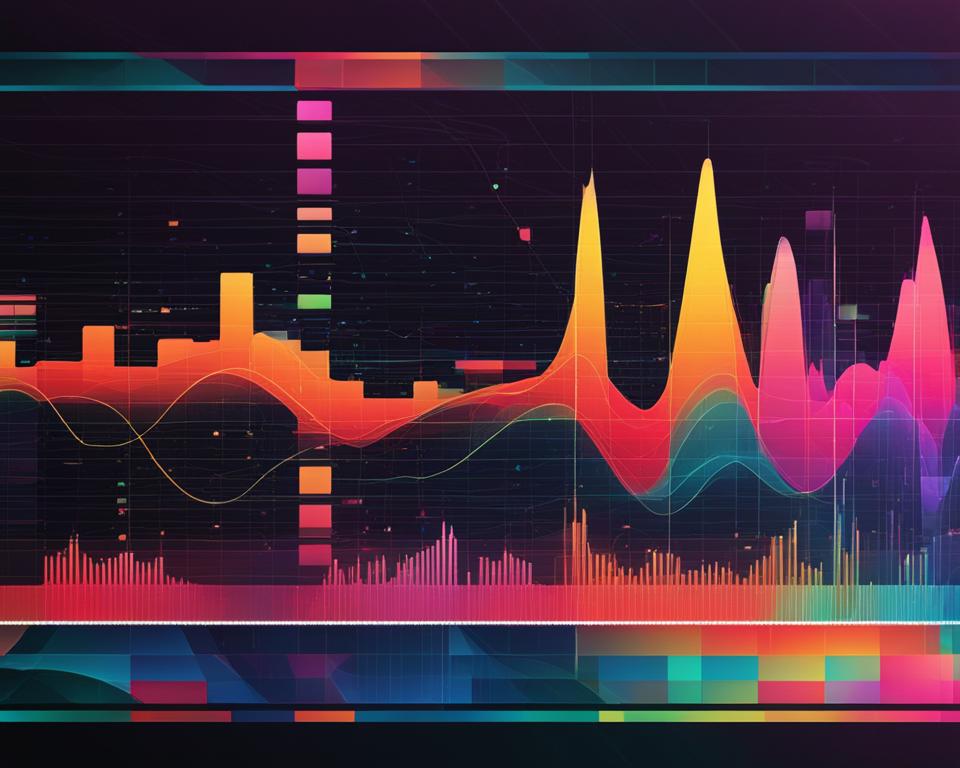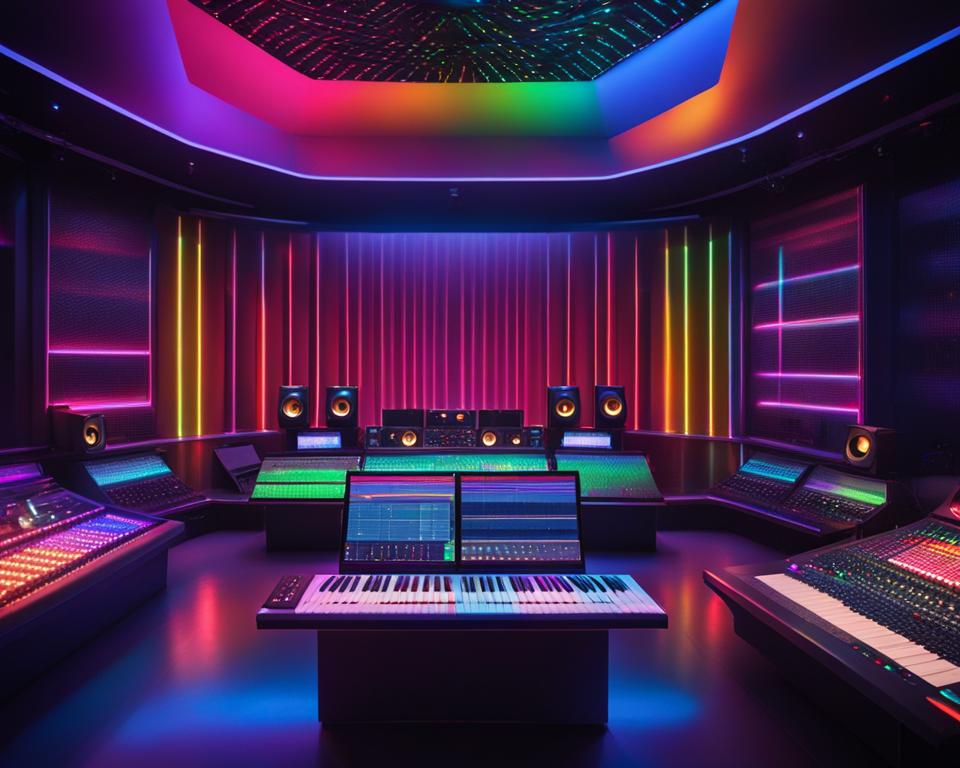Artificial Intelligence (AI) and music production have joined forces to create revolutionary music software tools known as AI music plugins. These plugins take advantage of machine learning algorithms, making the music composing and production process more efficient and creative than ever before.
In this article, I will explore the significance of AI music plugins in the evolution of music production, their features, functionalities, and benefits. I will also provide recommendations and tips on how to incorporate AI music plugins into your music production workflow while unlocking your creativity and refining your sound.
Whether you are a new music producer or an experienced industry professional, the use of AI music plugins can take your music production to new heights. Keep reading to discover more about this exciting technology!
The Evolution of AI in Music Creation and Production
Artificial intelligence has been revolutionizing the music industry since its inception. AI algorithms have enhanced the capabilities of music software by incorporating virtual instruments and audio plugins, allowing producers to create unique, high-quality music faster and more efficiently than ever before.
The first music production plugins appeared in the 1990s, and since then, they have evolved dramatically. In the early 2000s, virtual instruments became increasingly popular, allowing producers to use software to create realistic sounds that mimicked actual instruments. These virtual instruments could be used in conjunction with audio plugins that allowed producers to manipulate sounds and recordings, adding echoes, delays, and other effects.
As machine learning technology advanced, music software began to incorporate AI algorithms that could analyze and categorize sounds, allowing producers to identify and extract specific notes or parts of a recording. This made it easier to create music based on existing tracks or to build new music from scratch.
| Year | Advancement in Music Creation and Production |
|---|---|
| 1990s | Introduction of music production plugins |
| Early 2000s | Introduction of virtual instruments and audio plugins |
| Present day | Integration of AI algorithms in music software |
Today, some of the top AI music plugins incorporate machine learning algorithms that allow producers to analyze and manipulate sound in unprecedented ways. These plugins can be used to harmonize notes, detect beats and rhythms, and apply effects in real-time, optimizing and streamlining the production process.
The evolution of AI in music creation and production has allowed producers to create music that was once thought impossible. With the help of cutting-edge music production plugins, audio plugins, virtual instruments, and AI algorithms, creators can refine their sound and unlock new levels of creativity.
AI Algorithms: Composing, Enhancing, and Revolutionizing Music
AI algorithms are revolutionizing the way we create and enhance music. With the help of machine learning plugins, music technology has reached new heights, enabling us to create computer-generated music that would have been impossible to achieve before.
One of the greatest advantages of AI-driven music is the ability to experiment and create unique compositions. By analyzing vast amounts of data, machine learning algorithms can identify patterns and suggest new ideas to enhance music production. For example, Magenta Studio, a machine learning-based music composition tool, has been used by various artists to create fresh and innovative sounds.
Not only are these tools assisting in the creation process, but they are also enhancing the sound quality of our music. With the use of AI algorithms, music production plugins can automatically adjust parameters to refine sound quality and offer perceptive feedback for further improvement.
“AI-powered music is not about replacing the human element but adding further fuel to our creative fire.” – Yuval Gerstein, CEO of WaveAI
As AI technology continues to advance, we can expect to see more innovative machine learning plugins that will further revolutionize music composition and production. The possibilities are endless, and it is a truly exciting time for the music industry.
AI’s Influence on Artists and the Music Industry
The integration of AI technology in music production tools has brought about numerous benefits to artists and the music industry, ranging from enhanced efficiency to novel creative possibilities. With the aid of music production tools and music composition software, artists can optimize their workflow and streamline the creative process.
AI algorithms have proven to be instrumental in inspiring innovative music compositions, refining sound design, and optimizing mixing processes. The use of AI music software has enabled artists to experiment with new creative ideas, explore new styles, and enhance their overall sound quality. Moreover, incorporating AI technology into music production tools provides artists with ample time to focus on conceiving remarkable compositions and unlocking their innovative potential.
However, the increasing use of AI in music production does raise concerns regarding the impact on traditional music composition and songwriting. Some argue that the over-reliance on AI music software may detract from the authenticity and artistic merit of music produced. Despite this, it is evident that the integration of AI technology in music production tools and software holds promise in creating a positive impact on the music industry, encouraging efficient and novel music composition.
In conclusion, the integration of AI technology in music production tools and music composition software has revolutionized the music industry, allowing artists to take their compositions to new heights. AI algorithms offer unprecedented creativity and enhance the capabilities of music software. While they may pose concerns, their potential for efficiency, innovation, and novel music composition cannot be denied.
The Future Potential of AI-Driven Music
As the music industry continues to evolve, AI music plugins are gaining popularity among music producers. These plugins offer unique capabilities that enhance music creation, from composition to sound design. However, AI technology is still in its early stages, and there is significant potential for further advancements in music technology.
Emerging trends in music technology suggest that AI music plugins will become more prevalent in music production, offering a range of creative possibilities for producers. With the ability to analyze and process vast amounts of data, AI algorithms have the potential to enhance the way music is created and consumed.
Despite the potential benefits of AI-driven music, it’s important to address ethical considerations related to the increasing use of AI in music production. For example, there is a concern that AI may replace human musicians. However, many argue that AI tools simply augment human creativity and offer new ways of approaching music creation.
As AI music plugins become more advanced, they have the potential to provide exciting new opportunities for music producers to experiment with new sounds and approaches to music creation. By incorporating these tools into their workflow, producers can unlock their full creative potential and take advantage of the possibilities offered by AI-driven music.
Exploring the Top AI Music Plugins
If you’re looking to incorporate artificial intelligence into your music production, then checking out the top AI music plugins is a great place to start. Here are some of the best ones available on the market:
1. Amper Music: This AI music software enables users to quickly and easily create custom royalty-free music tracks. Its intuitive interface combines machine learning algorithms with professional-grade production elements, allowing users to create high-quality, polished tracks in minutes.
2. Landr: This AI music mastering platform uses machine learning algorithms to analyze a track’s sound and give it a professional-grade mix. It provides customized mastering for a variety of music genres and supports multiple file formats, including WAV, MP3, and AIFF.
3. Jukedeck: This AI music platform allows users to create and download custom audio tracks for use in videos, podcasts, and other media. It provides a vast library of pre-existing musical elements and allows users to customize various factors, including tempo, key, and style.
4. AIVA: This AI music composition software enables users to generate unique and original compositions for film, video games, and other forms of media. It uses sophisticated machine learning algorithms to analyze user preferences and create tailored soundtracks.
These AI music plugins offer a range of benefits, including time efficiency, high-quality production elements, and customized music tracks. With the right AI music software and plugins, artists and producers can unlock their creativity and take their music production to the next level.
Unlocking Creativity and Refining Your Sound with AI Music Plugins
As a music producer, I am always on the lookout for tools and techniques that can help me unlock my creative potential and refine my sound. With the emergence of artificial intelligence music plugins, this has become easier than ever before.
These innovative music software tools offer a range of features and functionalities that can assist in composition, sound design, and mixing, resulting in unique and high-quality music productions. AI music plugins have redefined the music production process, making it more efficient, creative, and streamlined.
One of the most significant benefits of AI music plugins is their ability to assist in composition by providing new and inspiring ideas. They can analyze existing compositions and generate new ones based on the style, genre, and mood of the music. They can also add harmonies, melodies, and rhythm patterns to existing compositions, offering endless possibilities for creative experimentation.
AI music plugins also provide a variety of sound design tools that enable producers to refine their sound and achieve the desired result. They can analyze and modify individual sound elements, such as EQ, compression, and reverb, to create a rich and layered sound. They can also generate unique sound effects and textures, adding depth and complexity to the music.
Finally, AI music plugins offer a range of mixing tools that assist in the final stage of music production. They can analyze and balance individual instrument levels, adjust panning and stereo width, and apply mastering techniques to the final mix, resulting in a polished and professional sound.
In conclusion, AI music plugins have become an essential component of the modern music production toolkit, offering a range of features and functionalities that can unlock creativity and refine sound. From composition to sound design and mixing, these music production tools have revolutionized the music industry, providing producers with endless possibilities for innovation and experimentation.




